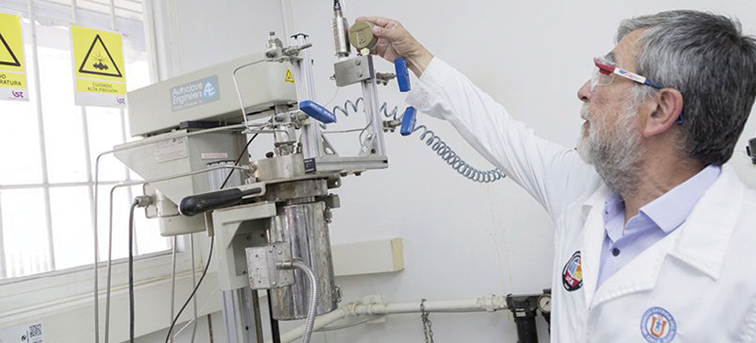Roasting of ore concentrates, the traditional method used to produce zinc, generates high levels of pollution, particularly from the release of sulphur in the form of SO2. A team of researchers from Chile’s Universidad Católica del Norte (UCN) is currently pursuing a goal of reducing the environmental contamination resulting from the process. The university, along with Innova-Corfo and VIACHA—a Bolivian mineral distributor company—have committed 242 million pesos to advance the project.
Although the technology is aimed at zinc production, the researchers believe the results also can be applied to other types of concentrates such as copper or gold, as well as for recovery of valuable byproducts derived from zinc production such as germanium and indium—both of which are used in the manufacture of electronic components.

Dr. Gerardo Fuentes, pictured here, will lead a Chilean research project to investigate and develop new approaches to zinc concentrate roasting technology, with an ultimate goal of ‘zero discharge to the atmosphere.’
“We [are pursuing] zero generation of discharge to the atmosphere,” explained Dr. Gerardo Fuentes, project director and professor in the Metallurgical and Mining Engineering Department at UCN. The project involves developing, retrofitting and transferring technology from autoclave reactors to enable production of zinc cathodes in an environmentally clean process.
The first step will be to install a pilot laboratory at the university’s facilities in Antofagasta. The lab’s primary equipment will include a 100-liter-capacity autoclave capable of generating roasting temperatures up to 300°C and pressures up to 500 psi. Installation of the autoclave is expected to take place in 2016. Ancillary equipment will include filters and reactors to prepare different types of slurries.
In Chile, production of zinc concentrate occurs at just two mines: El Toqui and La Florida. However, the prospect of enabling future production with less environmental impact has drawn interest from neighboring countries, Peru and Bolivia—both of which are major zinc producers.
Sergio Romo, chairman of VIACHA, said he believes the project’s goal is achievable, and he has confidence in the technical skills of the team conducting the study. “We have not seen any major technological developments in the world zinc industry for years,” he said, noting that this is an opportunity to develop improved technology for an industry that primarily employs a production method that is not environmentally friendly. “Zinc concentrate is a sulphurous concentrate that is treated using an oxidizing roasting method. This means removing the sulphur, by means of heat, as SO2, which is then captured in acid plants—but the level of capture in no case is 100%.”
Romero said the incomplete capture of off gases serves as the project’s motivation to study a cleaner approach to treat these concentrates while obtaining the same final product (refined zinc) through hydrometallurgical methods.
The project team has reported that, so far, results have been promising and future plans anticipate scaling-up the results obtained from an existing 1-liter autoclave at UCN to the 100-liter autoclave. “This kind of technology may be used not only with zinc, but also for arsenical copper and concentrates containing gold and antimony,” Romo explained.
The project, which was awarded last year and began its preparations in 2016, was submitted to authorities from Corfo (the Chilean Economic Development Agency) and the regional secretary of mining from Antofagasta, which expressed support for the initiative. The results of the research are expected to generate increased knowledge that will be valuable to an industrial sector that is critical for the Chilean economy.









